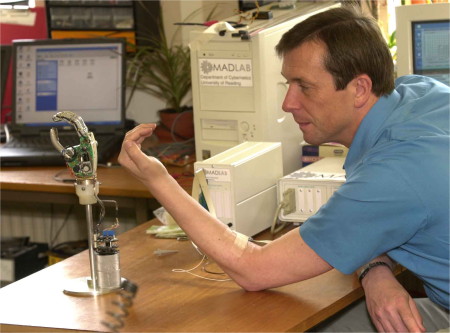Kevin
Warwick

Kevin Warwick is Professor of Cybernetics at the University of Reading, England, where he carries out research in artificial intelligence, control, robotics and cyborgs. He is also Director of the University KTP Centre, which links the University with Small to Medium Enterprises and raises over £2.5 million each year in research income.
Kevin was born in Coventry, UK and left school to join British Telecom, at the age of 16. At 22 he took his first degree at Aston University, followed by a PhD and research post at Imperial College, London. He subsequently held positions at Oxford, Newcastle and Warwick Universities before being offered the Chair at Reading, at the age of 33.
As well as publishing over 500 research papers, Kevins experiments into implant technology led to him being featured as the cover story on the US magazine, Wired.
Kevin has been awarded higher doctorates both by Imperial College and the Czech Academy of Sciences, Prague. He was presented with The Future of Health Technology Award in MIT, was made an Honorary Member of the Academy of Sciences, St. Petersburg and in 2004 received The IEE Achievement Medal. In 2000 Kevin presented the Royal Institution Christmas Lectures, entitled The Rise of the Robots.
Neural implants : a new kind of medicine or the next evolutionary step
There are now a number of ways in which technology and biology are being merged creating what in the science fiction world are termed Cyborgs Cybernetic Organisms. In this presentation a look will be taken at four different investigations involving the use of implant technology and micro electrode arrays.
You will be introduced to technology for identifying and tracking humans, robots with biological brains, deep brain stimulation for therapeutic purposes and neural implants to enhance human abilities. In each case practical experimentation involving Kevin's own research will be shown.
Investigation number 4 led to Kevin receiving a neural implant which linked his nervous system bi-directionally with the internet. With this in place neural signals were transmitted to various technological devices to directly control them, in some cases via the internet, and feedback to the brain was obtained from the fingertips of a robot hand, ultrasonic (extra) sensory input and neural signals directly from another humans nervous system.
A view will be taken as to the prospects for the future, including the realistic potential, by 2015, for thought communication thereby opening up tremendous commercial potential. Clearly though, an individual whose brain is part human - part machine can have abilities that far surpass those who remain with a human brain alone. Will such an individual exhibit different moral and ethical values to those of an individual today? If so, will this be the next evolutionary step for humanity?
